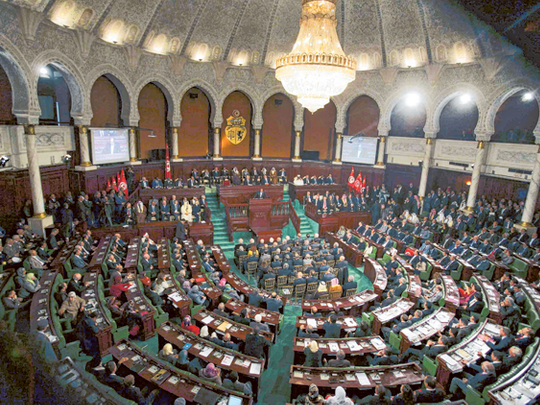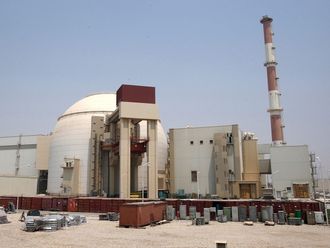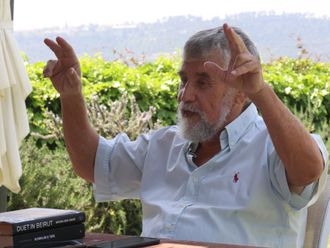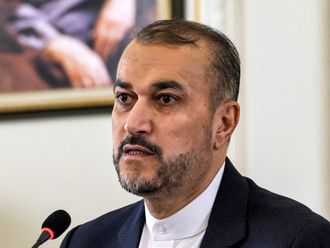
Tunis: As recently as December, the outlook for Tunisia remained grim. International lenders were withholding money, parliament remained deadlocked and investigations continued into the assassination of two politicians.
On Friday, French President Francois Hollande and other world leaders attended a ceremony for the formal adoption of a document being praised as one of the most progressive constitutions in an Arab nation.
What a turnaround.
The Arab Spring, which began in Tunisia, is now being described by many as a region-wide winter, especially in countries such as Egypt, where the country’s first popularly elected leader was deposed by the military, and Libya, where militias rule instead of a central government. But Tunisia remains a bright spot, since its fractious elected assembly finally wrote and passed a progressive constitution last month.
“This text honours your revolution. It can serve as an example and reference to many other countries,” Hollande said during the ceremony before Tunisia’s parliament. “You have an obligation to succeed for yourself and for all the other countries watching you. Tunisia is not an exception, it is an example.”
The speeches lauded the country’s ability to transcend differences and forge the consensus necessary to produce a constitution. The president of Libya’s parliament sounded almost rueful in his praise.
“Libya intends to follow the same path,” said Noori Abu Sahmein, whose country is struggling to register voters to elect the commission to write a constitution.
Tunisian President Moncef Marzouki in his address also highlighted the sacrifices the country made.
“By adopting the constitution, Tunisia celebrated a triple victory — over dictatorship, over terrorism that seeks to spread chaos and block our path to democracy and over our own divisions,” he said.
The praise contrasts attitudes toward Tunisia last July when Hollande last visited and the constitutional process was stalled.
“Today we are going again because it’s a success,” said an official with the French presidency, who spoke on condition of anonymity in keeping with government policy.
While Hollande is the only European head of state attending, the ceremony in Tunis also included a host of dignitaries from around the world, particularly from Africa.
Conspicuously absent was any representative from fellow Arab Spring nation Egypt, whose relations with Tunisia have been tense since Marzouki called for the release of his Egyptian counterpart Mohammad Morsi following his imprisonment by the military.
On Monday, US President Barack Obama called interim Tunisian Prime Minister Mehdi Jomaa and congratulated him on the new constitution, and invited him to visit Washington.
After overthrowing their dictator in 2011, Tunisians brought a moderate Islamist party into power allied with two other secular parties. But the coalition struggled in the face of continuing social unrest, high unemployment, the rise of a radical Islamist movement with ties to Al Qaida and the assassination of two left-wing politicians.
The deadlock over the constitution exacerbated the economic crisis in Tunisia, and the International Monetary Fund withheld a half-billion-dollar (Dh1.8 billion) loan.
Inflation soared, the budget deficit swelled, and demonstrations over high food prices and lack of jobs spread.
However, with the passage of the constitution, Tunisia’s image abroad has brightened, and the IMF released its planned loan. The slide of the Tunisian dinar has halted, and the stock market has perked up.
Ezzedine Saidane, a Tunisian financial expert, said the World Bank is now expected to extend a loan of its own soon, and the African Development Bank will lift a moratorium on lending to Tunisia.
“People feel better and are relieved somehow,” he said. “I think the mood has changed tremendously, both inside the country and outside the country.”
In a message, UN Secretary General Ban Ki-moon made it clear that it wasn’t just France that viewed the Tunisian experience as a model for the region.
“I count on the government and people of Tunisia to continue to inspire the world as they did some three years ago, and serve as an example for dialogue and compromise in resolving political disputes across the region and beyond,” he said.
The only sour note in the ceremony came when the US delegation walked out of the assembly hall during the speech by Ali Larijani, the speaker of Iran’s parliament, who took the opportunity to slam US and Israeli meddling in the region, calling the Jewish state a “cancerous tumour” in the region.
In statement, the US said its delegation left “due to the false accusations and inappropriate comments made by the Iranian representative present regarding the United States.”












